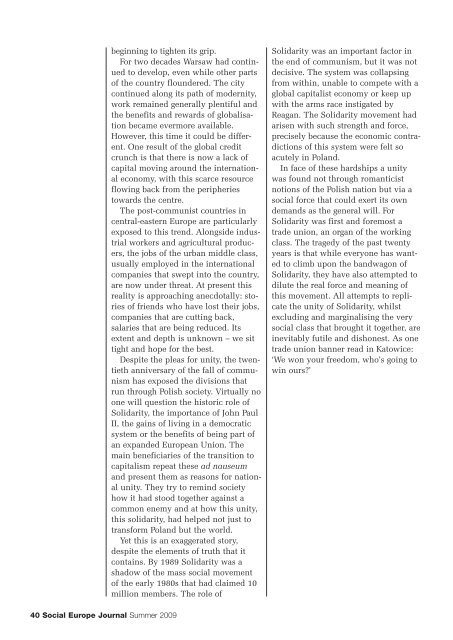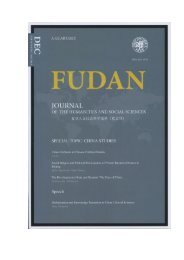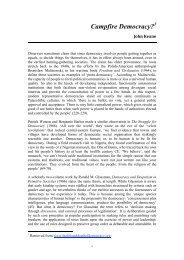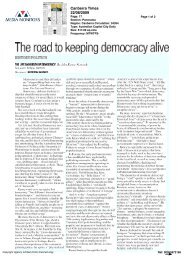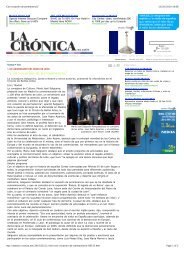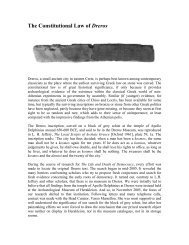The Ethics of Capitalism - Social Europe Journal
The Ethics of Capitalism - Social Europe Journal
The Ethics of Capitalism - Social Europe Journal
Create successful ePaper yourself
Turn your PDF publications into a flip-book with our unique Google optimized e-Paper software.
eginning to tighten its grip.<br />
For two decades Warsaw had continued<br />
to develop, even while other parts<br />
<strong>of</strong> the country floundered. <strong>The</strong> city<br />
continued along its path <strong>of</strong> modernity,<br />
work remained generally plentiful and<br />
the benefits and rewards <strong>of</strong> globalisation<br />
became evermore available.<br />
However, this time it could be different.<br />
One result <strong>of</strong> the global credit<br />
crunch is that there is now a lack <strong>of</strong><br />
capital moving around the international<br />
economy, with this scarce resource<br />
flowing back from the peripheries<br />
towards the centre.<br />
<strong>The</strong> post-communist countries in<br />
central-eastern <strong>Europe</strong> are particularly<br />
exposed to this trend. Alongside industrial<br />
workers and agricultural producers,<br />
the jobs <strong>of</strong> the urban middle class,<br />
usually employed in the international<br />
companies that swept into the country,<br />
are now under threat. At present this<br />
reality is approaching anecdotally: stories<br />
<strong>of</strong> friends who have lost their jobs,<br />
companies that are cutting back,<br />
salaries that are being reduced. Its<br />
extent and depth is unknown – we sit<br />
tight and hope for the best.<br />
Despite the pleas for unity, the twentieth<br />
anniversary <strong>of</strong> the fall <strong>of</strong> communism<br />
has exposed the divisions that<br />
run through Polish society. Virtually no<br />
one will question the historic role <strong>of</strong><br />
Solidarity, the importance <strong>of</strong> John Paul<br />
II, the gains <strong>of</strong> living in a democratic<br />
system or the benefits <strong>of</strong> being part <strong>of</strong><br />
an expanded <strong>Europe</strong>an Union. <strong>The</strong><br />
main beneficiaries <strong>of</strong> the transition to<br />
capitalism repeat these ad nauseum<br />
and present them as reasons for national<br />
unity. <strong>The</strong>y try to remind society<br />
how it had stood together against a<br />
common enemy and at how this unity,<br />
this solidarity, had helped not just to<br />
transform Poland but the world.<br />
Yet this is an exaggerated story,<br />
despite the elements <strong>of</strong> truth that it<br />
contains. By 1989 Solidarity was a<br />
shadow <strong>of</strong> the mass social movement<br />
<strong>of</strong> the early 1980s that had claimed 10<br />
million members. <strong>The</strong> role <strong>of</strong><br />
Solidarity was an important factor in<br />
the end <strong>of</strong> communism, but it was not<br />
decisive. <strong>The</strong> system was collapsing<br />
from within, unable to compete with a<br />
global capitalist economy or keep up<br />
with the arms race instigated by<br />
Reagan. <strong>The</strong> Solidarity movement had<br />
arisen with such strength and force,<br />
precisely because the economic contradictions<br />
<strong>of</strong> this system were felt so<br />
acutely in Poland.<br />
In face <strong>of</strong> these hardships a unity<br />
was found not through romanticist<br />
notions <strong>of</strong> the Polish nation but via a<br />
social force that could exert its own<br />
demands as the general will. For<br />
Solidarity was first and foremost a<br />
trade union, an organ <strong>of</strong> the working<br />
class. <strong>The</strong> tragedy <strong>of</strong> the past twenty<br />
years is that while everyone has wanted<br />
to climb upon the bandwagon <strong>of</strong><br />
Solidarity, they have also attempted to<br />
dilute the real force and meaning <strong>of</strong><br />
this movement. All attempts to replicate<br />
the unity <strong>of</strong> Solidarity, whilst<br />
excluding and marginalising the very<br />
social class that brought it together, are<br />
inevitably futile and dishonest. As one<br />
trade union banner read in Katowice:<br />
‘We won your freedom, who’s going to<br />
win ours’<br />
40 <strong>Social</strong> <strong>Europe</strong> <strong>Journal</strong> Summer 2009


